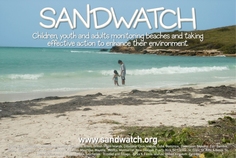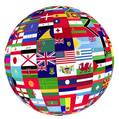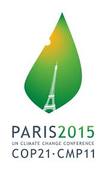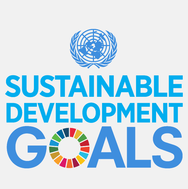
Sandwatch seeks to modify the lifestyle and habits of children, youth and adults on a community-wide basis and to develop awareness of the fragile nature of the marine and coastal environment and the need to use it wisely. It is an educational process through which school students and community members learn and work together to scientifically monitor their beach environments, so as to critically evaluate the problems and conflicts. They then develop and implement sustainable activities to address these issues, enhance the beach environment and build resilience to climate change.

Sandwatch is a volunteer network of schools (students, teachers and principals), youth groups, non-governmental and community-based organizations working together to monitor and enhance their beach environments. The network is coordinated by the Sandwatch Foundation, a non-profit organization.
Sandwatch is a volunteer network of schools (students, teachers and principals), youth groups, non-governmental and community-based organizations working together to monitor and enhance their beach environments. The network is coordinated by the Sandwatch Foundation, a non-profit organization.

Sandwatch has received support from the United Nations Educational, Scientific and Cultural Organization UNESCO through the education and science sectors and from the University of Puerto Rico through the Sea Grant College Program - both organisations were involved in Sandwatch from its early beginnings. Several other regional, as well as national organizations, both governmental and non-governmental have also provided support.
Sandwatch has received support from the United Nations Educational, Scientific and Cultural Organization UNESCO through the education and science sectors and from the University of Puerto Rico through the Sea Grant College Program - both organisations were involved in Sandwatch from its early beginnings. Several other regional, as well as national organizations, both governmental and non-governmental have also provided support.

Sandwatch started in the Caribbean in 1999, and has become an international activity involving islands as far apart as Cook Islands in the Pacific, Seychelles in the Indian Ocean, and the Bahamas in the Caribbean, as well as countries in Europe, Africa, Asia and South America.

Sandwatch presents an opportunity for people and ecosystems to respond to climate variability and climate change. Beaches are among the ecosystems at risk as they face rising sea levels and changes in storms and extreme events. Through Sandwatch, people can contribute to building ecosystem resilience and adapting to climate change.
Sandwatch presents an opportunity for people and ecosystems to respond to climate variability and climate change. Beaches are among the ecosystems at risk as they face rising sea levels and changes in storms and extreme events. Through Sandwatch, people can contribute to building ecosystem resilience and adapting to climate change.

Sandwatch is a practical example of education for sustainable development and seeks to empower people of all ages to assume responsibility for creating and enjoying a sustainable future. In particular, it develops skills relating to critical thinking and conflict resolution, and instils a sense of caring for beaches and the environment. Sandwatch also contributes to the implementation of the Small Island Developing Accelerated Modalities of Action (S.A.M.O.A.) Pathway and the Sustainable Development Goals 2016 – 2030.
Sandwatch is a practical example of education for sustainable development and seeks to empower people of all ages to assume responsibility for creating and enjoying a sustainable future. In particular, it develops skills relating to critical thinking and conflict resolution, and instils a sense of caring for beaches and the environment. Sandwatch also contributes to the implementation of the Small Island Developing Accelerated Modalities of Action (S.A.M.O.A.) Pathway and the Sustainable Development Goals 2016 – 2030.
At the end of the United Nations Decade of Education for Sustainable Development (ESD) Sandwatch was nominated as one of 25 successful ESD projects from around the world to present their work at the World Conference on Education for Sustainable Development in Japan in 2014